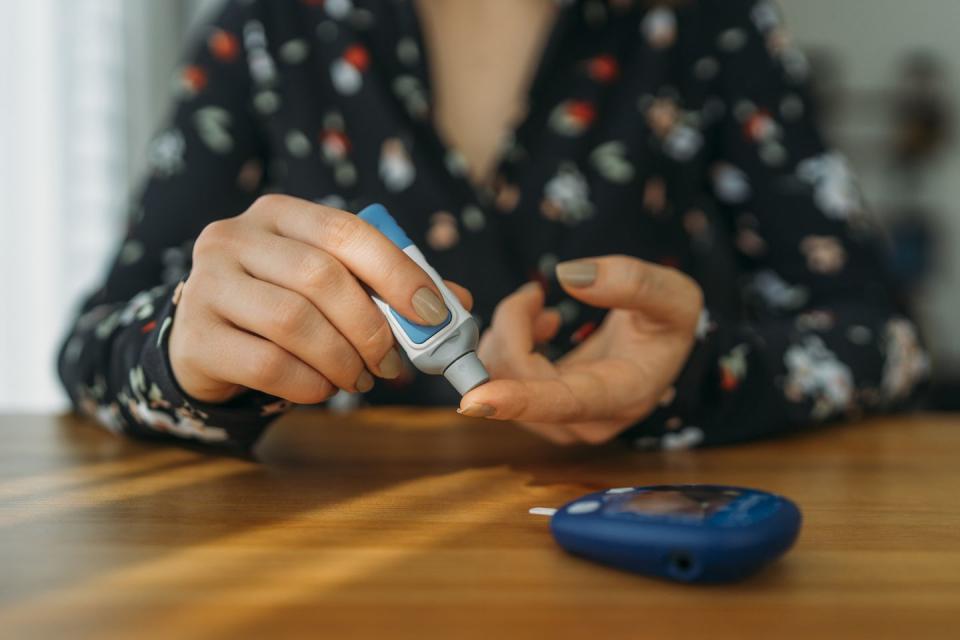I Tried a Food Sensitivity Test: Here’s What I Learned

I Tried a Food Sensitivity Test: Here’s What I Learned
For as long as I can remember, my stomach has just felt off. Random foods gave me an upset stomach. I’d experience the occasional bout of acid reflux and heartburn—and then some other less-than-pleasant symptoms. Nothing ever seemed severe enough to see a doctor, just enough of a nuisance to wonder if there was something I could easily change at home.
Enter food sensitivity kits: “Food sensitivity tests can give clarity and a starting point in finding answers to challenging symptoms and dietary concerns,” says Lisa Richards, nutritionist and author of The Candida Diet. The most well-known kit on the market, Everlywell, is an at-home test that uses a finger prick blood sample to measure your body’s immune response to 96 or 204 common markers, depending on the test, including gluten, soy, milk and nuts."
Food sensitivity is very different than a food allergy or food intolerance, although the three are often confused. Food allergies are immediate and can range from minor to life-threatening (like a deadly peanut allergy). Food intolerance can occur if you don’t have enough specific enzymes to break down a food (like lactose intolerance). So what are food sensitivities? They contribute to uncomfortable symptoms like stomach issues, acne, headaches, bloating and fatigue.
Everlywell recommends using the results to help you start an elimination diet. That way, you have a good starting point to pinpoint foods that may be giving you trouble. “Elimination diets can be burdensome, especially for those who do not have an actual sensitivity or allergy,” says Richards. “Putting in the work to end with no results can be frustrating, but starting with a sensitivity kit can give those interested in doing an elimination diet a great starting point and help them avoid pointless steps.” Everlywell includes a group or solo discussion with a healthcare professional with the cost of every kit. It's important to keep in mind that a food sensitivity test can’t (and shouldn’t) replace a medical diagnosis.

You probably need to eat the foods you're concerned about.
A food sensitivity test takes your blood and exposes it to various food to assess for an immune reaction. The antibodies being tested are called Immunoglobulin G (IgG). To test for IgG levels, you generally need to have eaten a certain food within four weeks of the test. So if you suspect a specific food sensitivity, you’ll want to make sure you didn’t eliminate the food from your diet altogether.
Food sensitivity isn't an official diagnosis, and some believe there isn't enough evidence to use IgG to diagnose sensitivities. “These levels reflect exposure to foods rather than reactions,” says Maria R. Mascarenhas, a pediatric gastroenterologist at the Children’s Hospital of Philadelphia. “Once the food is eliminated, the IgG level goes down and this is to be expected in anyone who stops eating a food irrespective of whether they have reactions or not."

The test is not for the squeamish.
Although the website advertises that you’ll need to provide a finger prick blood sample, it’s a bit more involved than I expected. I was doing the comprehensive test, which required 10 blood spots. Although I only had to prick my finger once, I had to squeeze and massage my finger repeatedly to allow blood drops to fall into each circle on the collection card. It wasn’t very easy to position your finger over each circle on the card, and I had a few drops that overflowed past the designated circle. You only get one chance to get it right, so if any of your blood drops overlap, you’ll need to request a new card. I had to leave the card somewhere safe to dry and then shipped it off the next day.

Your genes could play a part, too.
GenoPalate, another popular kit, uses your DNA to help you discover the best foods for your genes. The test, which can use existing DNA from 23andme or AncestryDNA, sends you a pretty thorough eating plan that is based on your genetic profile. You’ll also receive a breakdown of your body’s ideal intake of carbs, protein, fats, vitamins and minerals. However, there is some duplicate information that you may have found on a 23andme test, like lactose sensitivity and gluten sensitivity. The report won’t call out specific food sensitivities, but does make recommendations on good, great and best foods among vegetables, nuts, legumes, fats, fruits, meats and more.

You may be doing more harm than good.
Food sensitivities are relatively new and can’t be used for diagnosis of conditions or symptoms. Although you may be considering starting your elimination diet with the results from your kit, some medical professionals don’t recommend it. “Starting an elimination diet might restrict you from necessary nutrients in your diet,” says Bansari Acharya, registered dietitian and nutritionist, Foodlove.com. “You may be eliminating crucial ingredients from the diet that may have beneficial effects. The best starting point would be to talk to your healthcare provider about the symptoms that you are experiencing and the foods which you feel are causing your symptoms.”

Keeping a food diary is still important.
Whether or not you decide to use the results of a food sensitivity kit as a starting point, it’s still important to take notes on what you’re consuming. “Keep a detailed food and symptoms log for two weeks, and bring this to an appointment with a registered dietitian,” says Kacie Barnes, a registered dietitian nutritionist and owner of Mama Knows Nutrition. “They can fully analyze everything that's going on and help you with a personalized elimination diet, if necessary. A dietitian can assess your overall habits, intake, and other lifestyle factors that can contribute to the symptoms you're having, which a test cannot do."

A professional can help you understand the results.
Anna Binder McAsey, a registered dietitian with Rethink Nutrition, LLC, has seen a lot of confusion from overwhelmed people who don’t know what to do with their results. “Without the knowledge of how to reintroduce foods into the diet, people often get stuck in a long-term elimination diet,” she says. “When used correctly, food sensitivity test results can help guide an efficient elimination diet that provides symptom relief and leads to faster reintroduction of foods.”
She prefers testing over a general elimination diet when there is a suspected issue and the trigger food is unknown. Testing can help pinpoint specific foods and guides an elimination diet that is less restrictive.

Don’t be surprised if you’re more confused than when you started.
When I got back my results from Everlywell, I was initially surprised that only one food showed high IgG reactivity—egg whites. Egg yolks came up under moderate reactivity. Although I received detailed reports, I wound up with a mixed bag of what I should and shouldn’t eat. “It can be hard to identify which individual foods are problematic, since we generally eat meals that involve multiple ingredients, including hidden and trace ingredients,” says Sheena Batura, registered dietitian at Everlywell.
The skeptic in me had to compare the results to my GenoPalate test, which was based on my DNA. There was a lot of conflicting information between the two, leaving me with a lot of questions. For someone like me who is experiencing mild food sensitivity issues, Mascarenhas recommends talking to my physician first, then potentially an allergist and a gastroenterologist.
You might wind up with more questions than answers, but that’s not necessarily a bad thing.